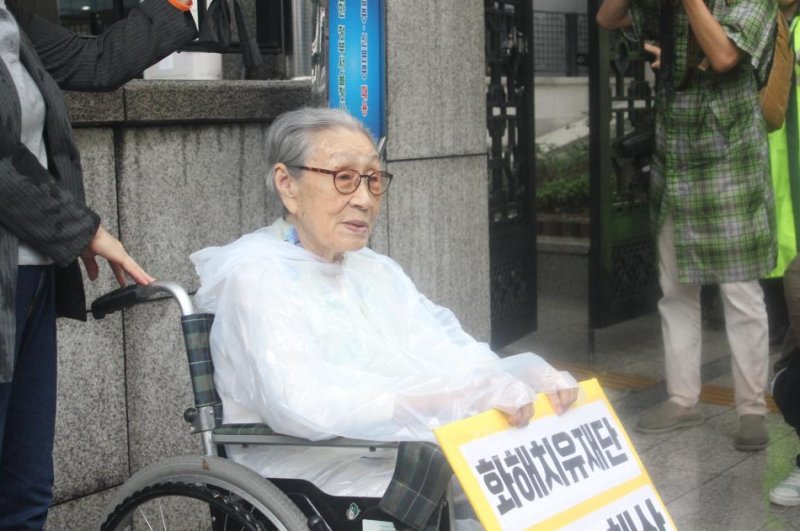Former "comfort woman" Kim Bok-dong staged a one-woman rally in Seoul on Monday, calling for the disbandment of the Reconciliation and Healing Foundation set up to provide financial reparations to victims of Japanese wartime sex slavery. Photo by Elizabeth Shim/UPI
SEOUL, Sept. 4 (UPI) -- Lack of progress on a fund set up in 2015 to assist former "comfort women" may be becoming too much to bear for victims who seek an official apology from Japanese Prime Minister Shinzo Abe.
Former comfort women and activists of the Korean Council for Justice and Remembrance for the Issues of Military Sexual Slavery by Japan said Monday they are launching a month-long series of rallies outside government agencies to remind South Korean President Moon Jae-in and his foreign minister, Kang Kyung-hwa, they are rejecting the proposed $9 million in Japanese funds.
Kim Bok-dong, a prominent survivor who was one of the first women to break the silence on her experience as a wartime sex slave, launched planned protests this week with a rare public appearance outside the South Korean foreign ministry.
Kim, 92, arrived outside the government building in a van Monday morning, as heavy rain lashed activists waiting for her on the curbside with a wheelchair.
The former comfort woman said she had undergone an operation but had to leave her bed to make one final plea.
"I received surgery five days ago, but things are going so wrong, I had to come out," Kim told reporters.
Kim, a household name in South Korea, has said she was forcibly recruited into Japanese wartime brothels when she was 15. She was repeatedly assaulted in "comfort" stations in Hong Kong, Singapore, Indonesia and Malaysia and was subsequently unable to bear children.
The outspoken woman, affectionately known as "Kim Bok-dong grandmother" in the South, appeared frail in her wheelchair, wearing a rain poncho and holding a placard. Her message regarding the South Korean "Reconciliation and Healing Foundation" was clear.
"Even if you give us $100 million we cannot accept it. We would refuse and return it," Kim said.
Last year, a U.S.-based Japanese diplomat, Shinozuka Takashi, described the sexually enslaved women and girls as "paid prostitutes."
In what appeared to be a rebuttal to such assessments of the women, Kim said a greater principle is at stake.
"This is preposterous," she said, referring to the continued operation of the government-initiated foundation despite opposition. "Did you think we were fighting up until now, in order to receive some funds?"
Kim also said she has become disillusioned with Moon, who visited with her when she was hospitalized in January.
"I cannot trust the president," she said, referring to earlier pledges from Moon to scrap the 2015 comfort women agreement with Tokyo, created without activist input. "How can we trust him, when no move has been made?"
Calls for disbandment
The Reconciliation and Healing Foundation was created after former South Korean President Park Geun-hye and Abe co-signed an accord to provide nearly $10 million in funds as reparations to surviving comfort women.
By the end of 2016, most of the survivors agreed to accept Japanese compensation, according to Asia Times.
But Kim and others, who have monitored Abe's responses on the issue, say they need a direct official apology to address past Japanese misdeeds.
Lauren Richardson, a lecturer at the Asia-Pacific College of Diplomacy at Australian National University, told UPI by e-mail that the comfort women's funds have a troubled history that date back to 1995.
"The Japanese government's first diplomatic attempt at resolving the comfort women issue was the Asian Women's Fund," Richardson said.
The money provided to victims came from private Japanese contributions, which became an issue for South Korean activists and the women. By 2015, Tokyo had decided to use government funds to "settle the issue once and for all" -- but another problem ensued.
"For victims to conceive of and accept the money as state compensation, it would need to be transferred directly from Japanese government coffers to individual victims. Yet this was not the case," Richardson said, adding the 2015 deal has a history that dates back to 2011 and long negotiations between Seoul and Tokyo's foreign ministries.
Washington anxious for deal
Richardson said there might have also been pressure building behind the scenes for South Korea and Japan to reach a deal, as the United States sought closer coordination on security, particularly on North Korea.
"The U.S. government has a long history of mediating Japan and South Korea's history disputes," Richardson said. "In the lead-up to the signing of the 2015 accord, the U.S. Embassy in South Korea attempted to extinguish any ancillary fires between Seoul and Tokyo that could prevent them from reaching an agreement."
Both the Obama and Trump administrations have been careful to criticize Tokyo on its lack of willingness to issue an official apology. U.S. President Donald Trump's embrace of a former comfort woman, Lee Yong-soo, during a state dinner in Seoul in 2017, was quickly followed by complaints from Tokyo.
U.S. silence on the issue could be bothering the activists, but Kim told UPI on Monday her work addresses a larger issue: Tensions with North Korea, and its impact on the way Washington views South Korea, an ally, and subsequently South Korea's historical disputes with Japan.
"The United States president thinks too negatively about our country," Kim said. "To the best of his ability, President Trump should work toward supporting better North-South relations. The United States should work in cooperation, so that unification is realized as soon as possible."
Trump's recent cancellation of Secretary of State Mike Pompeo's trip to North Korea had dashed hopes in the South of a more speedy reconciliation.
"If [Trump] is the president of a great country, he should take careful consideration of South Korea's perspective."















